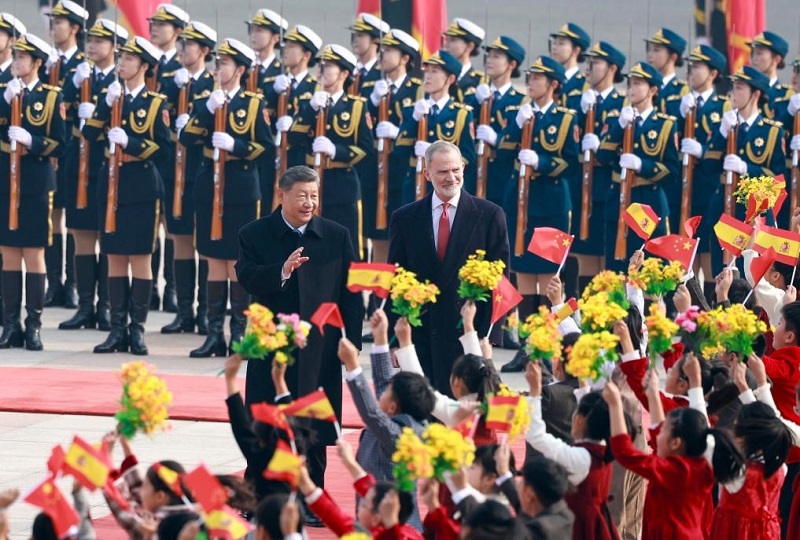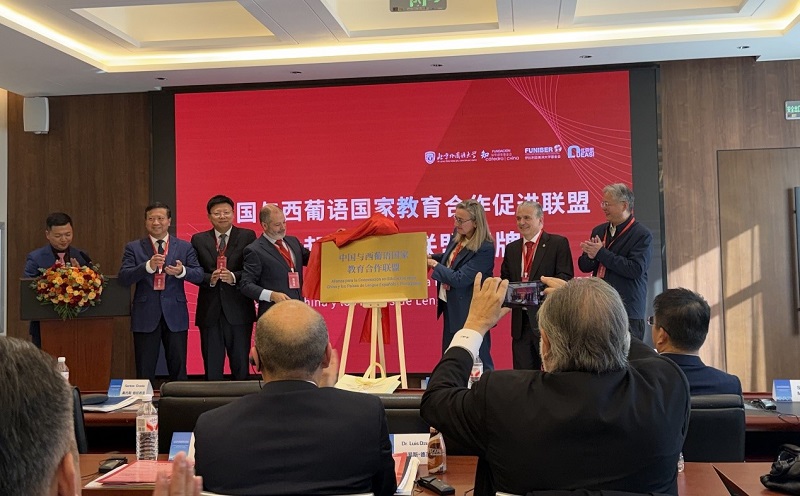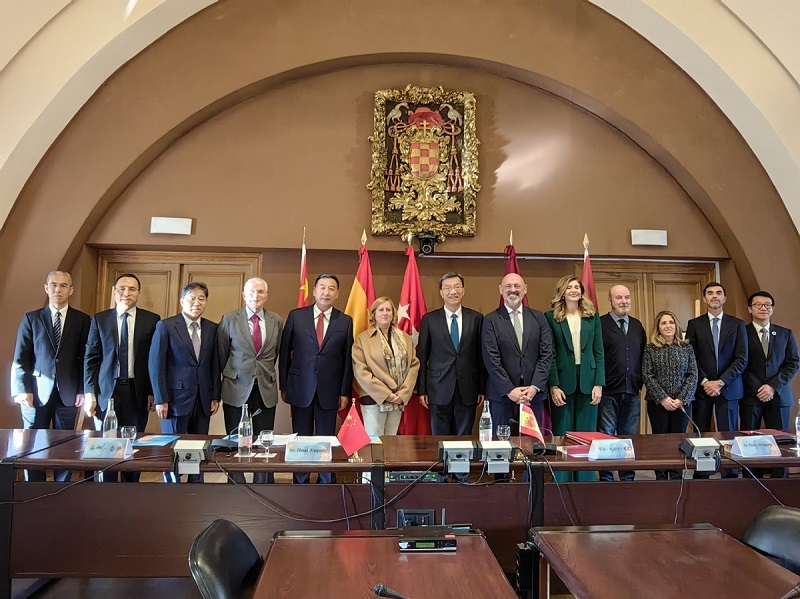During his first visit to China, in November this year, since his accession to the throne, Spanish King Felipe VI witnessed the signing of 10 cooperation documents covering trade, economy, science and technology, and education. In their meeting, Chinese President Xi Jinping emphasized the need to advance practical cooperation and strengthen people-to-people ties, specifically underscoring the importance of enhancing cultural and educational exchanges, including support for each other’s cultural and language institutions. King Felipe VI expressed Spain’s readiness to strengthen cultural, linguistic and tourism exchanges to enhance the friendship between the two peoples.

Chinese President Xi Jinping holds a welcome ceremony for King Felipe VI of Spain at the square outside the east gate of the Great Hall of the People prior to their meeting in Beijing, capital of China, Nov. 12, 2025. (Xinhua/Ding Haitao)
Echoing this shared vision, the Forum for Cooperation between China and Spanish- and Portuguese-Speaking Countries was held in Beijing on November 13. The forum saw the launch of the Alliance for Promoting Education Cooperation between China and Spanish- and Portuguese-Speaking Countries, with dozens of participating universities, including China’s Beijing Foreign Studies University, Nanjing University of Finance and Economics, and Bohai University, Spain’s European Atlantic University, and Mexico’s International Iberomerican University.

The Alliance for Promoting Education Cooperation between China and Spanish- and Portuguese-Speaking Countries is launched in Beijing on November 13, 2025.
At the opening ceremony of the forum, Xu Lüping, vice president of the China NGO Network for International Exchanges, noted that head-of-state diplomacy has guided the continued deepening of mutual political trust between China and Spain, intensifying exchanges at all levels and promoting steady growth in educational cooperation. She highlighted the compatibility between the Chinese philosophy of “harmonious coexistence” and the Iberian spirit of “openness and inclusiveness,” calling for expanded cultural exchanges to preserve civilizational treasures and promote equal dialogue among cultures.
Ramón Calduch, vice president of the event’s co-organizer Spain-based Cátedra China Foundation (FCC), stated that when political agendas open doors, it is essential for civil society, academia, cultural circles, and businesses to jointly infuse substance into these cooperation frameworks. This, he noted, is the very purpose of their gathering.
According to Calduch, the alliance will establish a technical secretariat with branch offices in China, Spain, Portugal, and an Ibero-American capital to coordinate agendas, monitor progress, and issue annual reports. It will also launch the “Bridge 2030 Initiative,” an annual open call for academic, cultural, scientific, and corporate projects, providing cross-sector mentorship and granting a “China-Ibero-America Best Practice” award. An observatory will also be set up to develop data platforms, conduct impact assessments, and offer technical support to governments, universities, and enterprises.
Santos Gracia, president of the Ibero-American University Foundation (FUNIBER), another co-organizer, stressed the importance of promoting linguistic and cultural diversity to prevent global cultural homogenization. He described Spanish as a key vehicle for culture and communication, capable of enhancing educational cooperation and people-to-people exchanges while supporting China’s global engagement. Gracia cited the agreement between China’s Bohai University and Spain’s European Atlantic University to establish a joint campus in China as a concrete example, affirming that “promoting our mutual cultural exchanges through education is an indispensable measure.”
Bohai University and European Atlantic University formalized their partnership in April 2024, launching a joint MBA program to foster internationalized higher education, share resources, and cultivate talent with a global perspective. The two institutions also plan to explore further collaboration in faculty and student exchanges, short-term study programs, and joint training in other fields.
China-Spain education cooperation has been particularly dynamic in recent years, spanning in-depth partnerships between top universities and frequent academic exchanges.

A research center aimed at enhancing educational collaboration and promoting mutual exchange and learning between China and Spain is launched in Madrid, Spain, on Dec 1, 2024. [China Daily]
In December 2024, Renmin University of China and Complutense University of Madrid jointly established the China-Spain Center for Civilizational Exchanges and Mutual Learning in Madrid. The center aims to promote civilizational dialogue, uphold diversity, advance cultural inheritance and innovation, and create new platforms for youth and academic exchanges.
On October 15, 2025, Spanish Foreign Minister José Manuel Albares Bueno visited the Hangzhou international campus of Beihang University, which has strong ties with Spanish institutions like the Polytechnic University of Valencia. Following the launch of the Beihang Valencia Polytechnic Institute (BVPI), plans are underway to establish a China-Spain school of intelligence, offering programs in artificial intelligence and embodied intelligence.
Minister Albares described the school as a milestone in bilateral relations, reflecting a shared commitment to cooperation and mutual understanding. He emphasized that educational collaboration serves not only as a means of knowledge sharing but also as a bridge for fostering rationality and empathy in a complex world.
Student exchanges have also been vibrant. In July 2025, a group of 100 faculty and students from Spain’s Polytechnic University of Catalonia joined peers from Tongji University in Shanghai for the “Quantum City: Spatiotemporal Innovation and Creativity Summer Camp” on Fuxing Island of Shanghai.
As one of the largest single-group educational exchanges from Spain to China in recent years, the camp produced nine innovative design proposals centered on the themes of “Digital Intelligence Island,” “Design and Art Island,” and “People-Oriented City.” The projects showcased cross-cultural and interdisciplinary approaches to urban renewal, blending historical preservation with future-oriented vision. They span multiple dimensions such as the revitalization of industrial heritage, the construction of community life circles, and the application of digital technologies. This initiative thus injected fresh momentum into advancing urban sustainability and deepening educational and people-to-people cooperation between China and Spain.
On September 24, 2025, the “China Today Salon in Madrid” dialogue on talent cooperation was held at the Spanish Friends of China Association. A key outcome was the signing of a trilateral agreement among the Center for Europe and Africa (China Today) under China International Communications Group (CICG), Spanish Friends of China Association, and Beijing Institute of Talent Development Strategy to establish the Beijing-Madrid Talent Liaison Station, which was officially inaugurated during the China-Europe Talent Forum on September 25. Zhao Lijun, president of China Today, noted that the station will link universities, enterprises, and cultural institutions from Beijing and Spain, facilitating exchanges in technology, culture, and youth engagement.
Álvaro Costas, secretary general of the Social Council of Complutense University of Madrid, said that the university has established Spanish language programs with 37 Chinese universities and signed 31 inter-school agreements, with over 1,000 Chinese students currently enrolled.
At the Forum for Cooperation between China and Spanish- and Portuguese-Speaking Countries, Xia Jianhui, deputy director of the Chinese Service Center for Scholarly Exchange under the Ministry of Education, highlighted the center’s role in providing full-chain services for outbound and inbound students, including degree certification and career support. Despite challenges such as fluctuating interest in study abroad, he noted that initiatives like the global study tour alliance are actively advancing international education cooperation.
F. Álvaro Durántes, professor at European Atlantic University, emphasized at the forum that cooperation between Ibero-American countries and China under the Belt and Road Initiative constitutes a key pillar of South-South partnership. He stressed the role of the Spanish language in facilitating dialogue for a global governance order based on multilateralism.
Chang Fuliang, dean of the Department of Hispanic and Portuguese at Beijing Foreign Studies University, pointed to a growing demand for talent proficient in Spanish and Portuguese, urging cultivation of interdisciplinary professionals skilled in law, international organizations, and communication who are capable of direct engagement in Chinese, Spanish, or Portuguese.
Luis Dzul, president of Mexico’s International Iberomerican University, noted shared emphases on order and rationality in Confucian and Iberian philosophies as a foundation for deeper cooperation towards a community with a shared future for humanity.
Rubén Calderón, president of Spain’s European Atlantic University, highlighted the strategic complementarity between Ibero-American resources and markets and China’s 15th Five-Year Plan, identifying collaboration potential in new energy, digital economy, critical minerals, and BRI infrastructure, with Spain and Portugal acting as EU gateways for a balanced and sustainable global development partnership.
In her concluding remarks, Marta Montoro, director-general of the FCC, described the forum as a vivid example of cooperation between China and Spanish- and Portuguese-speaking countries. She emphasized the enduring relevance of Confucian values such as harmony, ethics, and common good, noting that education collaboration sows seeds for a more just, prosperous future.
The forum, co-organized by Beijing Foreign Studies University, the FCC, and the FUNIBER and supported by the CICG Center for Europe and Africa (China Today) and the China NGO Network for International Exchanges, saw attendance of more than 100 representatives from government, think tanks, NGOs, and universities.
As President Xi stated, China is ready to work with Spain to forge a comprehensive strategic partnership with greater strategic determination, dynamism and global influence. King Felipe VI also expressed Spain’s willingness to strengthen exchanges with China, seize opportunities presented by China’s 15th Five-Year Plan, and expand cultural, linguistic, and tourism ties to deepen friendship between the two peoples.
These vibrant cooperative efforts are steadily turning the leaders’ vision into reality.